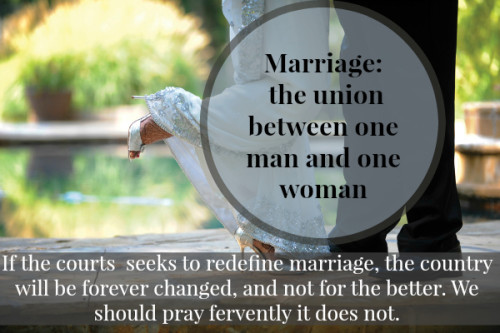The highest court in the land will either restore the freedom of the people to uphold marriage, as the union between one man and one woman, in their state laws — or not. Judges in courts across the nation have denied citizens their voice in this matter, striking down laws protecting marriage in 20 states. Appeals courts have upheld these rulings. But not the Sixth Circuit. This court upheld laws in Ohio, Kentucky, Michigan, and Tennessee that defined marriage as the union between one man and one woman. And that is the case that will be heard at the U.S. Supreme Court.
That’s a good sign, says Austin Nimocks, an attorney with Alliance Defending Freedom. He contends, “the Sixth Circuit gave the Supreme Court the opportunity to affirm what states across the country did in preserving the longstanding definition of marriage in their state constitutions.” “Marriage cases are NOT,” says Austin Nimocks, “about whether same-sex marriage is a good idea or should become policy.” The Supreme Court took for review an opinion that is the perfect vehicle because, unlike the other circuit courts that struck down state marriage laws, the Sixth Circuit is, he says, “instead focusing on its limited role as a federal court.”
Mr. Nimocks emphasizes, “The Constitution does not demand that a new view of marriage be judicially imposed on everyone.”
Evan Wolfson, President of the gay marriage advocacy group Freedom to Marry disagrees. He says the Supreme Court’s decision to take the case “begins what we hope will be the last chapter in our campaign to win marriage nationwide.”
U.S. Attorney General Eric Holder says the Obama administration will ask the Court to strike down state restrictions on same sex marriage and to extend gay marriage to the whole nation.
Signaling the importance of this case, the Court is extending the time it usually allots for argument from an hour to 2 ½ hours. It will consider two discrete questions:
First — Does the Constitution require a state to license for marriage two people of the same sex?
And, if the answer to that question is ‘no,’ the court will look at whether a state must recognize same sex marriages that took place in other states. Currently same sex couples are marrying in 36 states and the District of Columbia.
The Supreme Court has so far avoided ruling directly on same sex marriage. In October it declined to hear appeals in several cases where state laws protecting marriage had been struck down. Now that the Sixth Circuit has upheld such laws in 4 states, there’s a circuit split and the High Court is stepping in.
The courts set this profound social change in motion. Now, will the Supreme Court ratify it? The Court’s ruling is expected in June. If it seeks to redefine marriage, the country will be forever changed, and not for the better. We should pray fervently it does not.
 Listen Online
Listen Online Watch Online
Watch Online Find a Station in Your Area
Find a Station in Your Area









 Listen Now
Listen Now Watch Online
Watch Online
